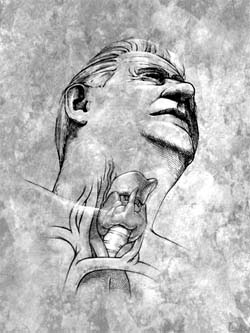Dec 19, 2025
Dec 19, 2025
by Neeta Lal
 When Amita Thakkar, 43, a vivacious travel writer, began feeling uncharacteristically depressed and fatigued all the time, she was baffled. Another cause for worry was the recent weight gain - despite being a careful eater - and the unusually heavy periods. When a battery of pathological tests couldn't nail her problem, Thakkar was chivvied to a physician who diagnosed her condition as hypothyroidism.
When Amita Thakkar, 43, a vivacious travel writer, began feeling uncharacteristically depressed and fatigued all the time, she was baffled. Another cause for worry was the recent weight gain - despite being a careful eater - and the unusually heavy periods. When a battery of pathological tests couldn't nail her problem, Thakkar was chivvied to a physician who diagnosed her condition as hypothyroidism.
Over 40 million Indians - 60 per cent of them women - suffer from thyroid-related disorders, according to the Cochin-based Indian Thyroid Society (ITS). Last month, ITS observed the Think Thyroid month and launched a pan-India mass awareness campaign to sensitize people about the largely under-diagnosed thyroid disorders.
"What is most alarming about thyroid disorders in India," says Dr Vinay Jha, endocrinologist and consultant at Max Healthcare, New Delhi, "is that they are usually diagnosed very late, if at all. Awareness is very low and often the symptoms are confused with Chronic Fatigue Syndrome (CFS) or menopause. In fact, most patients usually come to us after their disorders have reached an advanced stage."
According to the specialist, women are four times more likely to be afflicted with thyroid disorders than are men. He advises women to go in for a thyroid scan every few years after they hit 35. A simple blood test can measure the Thyroid Stimulating Hormone (TSH). When the thyroid is under-active, TSH registers low levels and if the gland is overactive, it records a high. "The optimal level of this hormone is crucial in maintaining our metabolic rate and determining growth in youngsters," says Dr Jha.
While the small, butterfly-shaped endocrine gland's primary function is to convert iodine (which we take in through food) into three thyroid hormones - thyroxine (T4), triiodothyronine (T3), and calcitonin that affect the general metabolism; it also regulates body heat and bone growth. The pituitary gland (located in the brain) and thyroid work in synergy. If the thyroid emits low levels of the hormones, the pituitary gland starts secreting more thyroid-stimulating hormones (TSH) in order to stimulate it.
When a thyroid disorder develops, the body's capacity to use up energy decelerates or accelerates remarkably. It also increases risk of degenerative diseases such as heart disease, cancer and arthritis.
A sluggish thyroid gland causes hypothyroidism, which leads to weight gain, fatigue and hypersensitivity to low temperatures. According to experts, approximately one in 50 women and one in 1,000 men are likely to develop symptoms of hypothyroidism at some stage in their lives.
A hyperactive thyroid, on the other hand, manufactures an overdose of thyroid hormones. The condition is called hyperthyroidism and it triggers weight loss, a faster heart rate and sensitivity to heat.
"Thyroid disorders," says Delhi-based general physician Dr Satya Prakash, "could be due to genes or external factors like lack of iodine."
Because thyroid hormones play a catalytic role in the body's development process, a malfunction can severely impact a child or teen's growth. Hypothyroidism patients grow slowly, experience slow sexual development, muscle weakness, dry skin, hair loss, poor memory and short attention spans. In women, this condition can alter the onset of periods. Girls with thyroid problems experience an erratic or decreased/increased menstrual flow.
Elaborates Dr Anjila Aneja, gynecologist and coordinator, Max Super Specialty Hospital, New Delhi: "It can play havoc with a woman's puberty and menstruation. Abnormally high or low levels of thyroid hormone can cause very light/very heavy or irregular menstrual periods. They can even lead to amenorrhea (absence of menstrual periods). An over- or under-active thyroid can prevent a woman from ovulating. Also, the ovaries are at a heightened risk for cyst development if the woman has an under-active thyroid." Thyroid disorders can also cause premature menopause; while during pregnancy they can harm the fetus and lead to postpartum thyroiditis.
A major problem with thyroid disorders is that they can't be easily diagnosed, as they are often missed in tests. In case of mild hypothyroidism, the patient may not see the symptoms coming - simply because the condition exhibits no symptoms at all - before the ailment advances. According to Dr Prakash, hyperthyroidism can cause restlessness, irritability, increased perspiration, fatigue, insomnia, irregular menstrual periods and muscle weakness. Sometimes, the tissues around the eyes swell up and appear to bulge out, leading to `toad eyes'.
Very often, symptoms of hyperthyroidism - such as lack of menstruation, hot flashes, insomnia and mood swings - are confused with the onset of menopause.
Graves' disease, an autoimmune thyroid disorder, is the most common cause of hyperthyroidism. Under this condition, the immune system produces abnormal antibodies, which prompt the thyroid gland to manufacture extra thyroid hormones. Eventually, the gland enlarges, triggering goiter. (Goiter generally refers to the enlargement of the thyroid gland. It is usually marked by uniform swelling in the neck in front of windpipe. Women are more prone to this disease.) Graves' disease is common among women, teens and middle-aged adults.
While thyroid disorders are tricky to diagnose, the good news is that if detected in time, they are usually easy to treat and cure. Says Dr Jha, "Treatment of hyperthyroidism involves anti-thyroid drugs, radioactive iodine and in rare cases, surgery. Hypothyroidism, on the contrary, usually requires replacement of the thyroid hormone by oral pills customized to produce the required optimal thyroid hormone levels."
With the exception of eating a balanced diet, there's not much that can be done to prevent thyroid disorders. That's why it is important to get an annual check-up that includes a thyroid-stimulating hormone test, and maintain an appropriate programme of nutrition and exercise.
24-Feb-2008
More by : Neeta Lal